A timeline of the Jeremy Skibicki case
Warning: This article contains content that may be disturbing to readers. Discretion is advised.
The trial for the admitted killer of four Indigenous women has wrapped up in Winnipeg, and a verdict is set to be delivered next month.
Jeremy Skibicki admitted to killing four Indigenous women – Rebecca Contois, Marcedes Myran, Morgan Harris and an unidentified woman who has been given the name Mashkode Bizhiki'ikwe or Buffalo Woman.
He is facing four counts of first-degree murder, but has pleaded not guilty, with his lawyers arguing he is not criminally responsible for the deaths by way of mental disorder.
Below, CTV News Winnipeg breaks down the timeline of events that happened between the onset of the investigation in May 2022 and the end of the trial.
May 2022
A Winnipeg police investigation started on May 16, 2022, after partial human remains were found in the 200 block of Edison Avenue in North Kildonan.
The remains were identified as 24-year-old Rebecca Contois. On May 18, 2022, police arrested 35-year-old Jeremy Skibicki and charged him with first-degree murder.
Officers at the scene were searching a nearby garbage bin and investigators couldn't rule out the possibility of "additional victims."
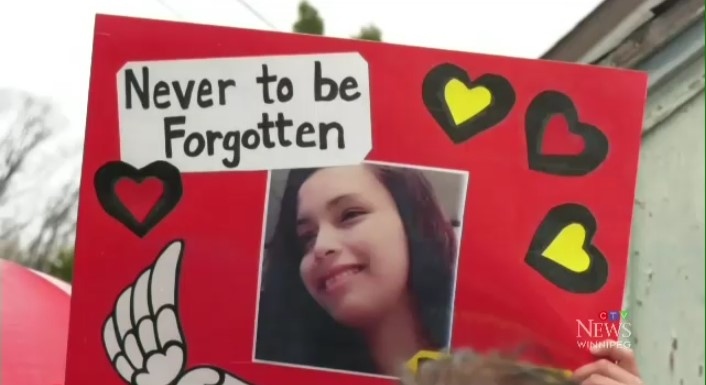 Rebecca Contois (CTV Winnipeg)
Rebecca Contois (CTV Winnipeg)
June 2022
Winnipeg police started searching the Brady Road Landfill for the partial remains of Contois on June 2, 2022. A section of the landfill had been secured and dumping in the area was stopped.
On June 14, 2022, police said human remains had been found at the landfill, and on June 21, 2022, police confirmed they were the remains of Contois.
December 2022
Investigators charged Skibicki with three more counts of first-degree murder on Dec. 1, 2022, in relation to the killing of three more Indigenous women between March and May 2022- all previous to Rebecca Contois.
Police told the public that an unidentified woman – who was later given the name Buffalo Woman or Mashkode Bizhiki'ikwe by the Indigenous community– was killed around March 15, 2022. She was in her mid-20s.
The two other victims were 39-year-old Morgan Harris and 26-year-old Marcedes Myran.
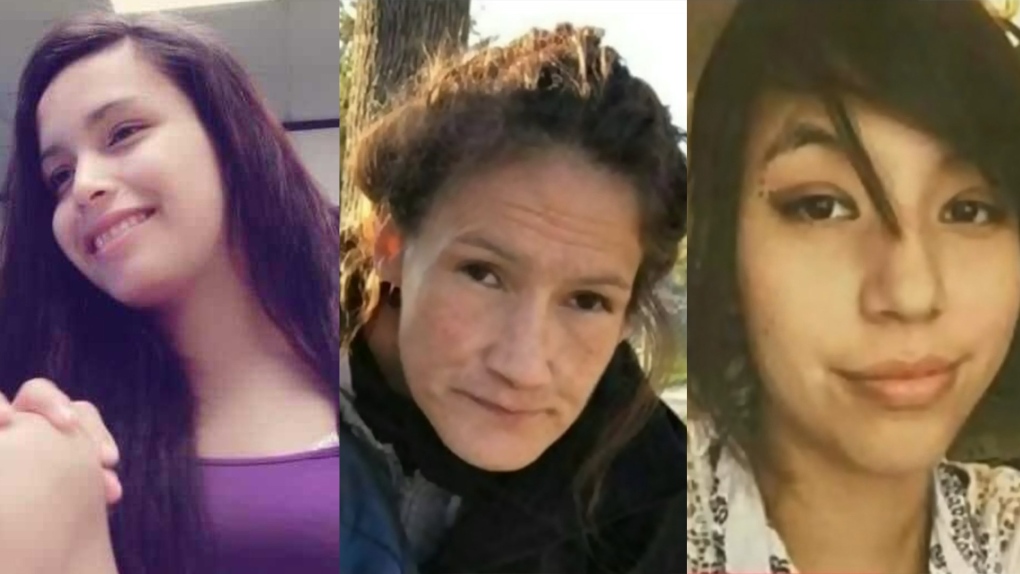 Rebecca Contois (left) Morgan Beatrice Harris (centre) and Marcedes Myran (right), along with a fourth unidentified woman referred to as Buffalo Woman (Mashkode Bizhiki’ikwe), have been identified as the four victims of Jeremy Skibicki. (CTV Winnipeg photo)
Rebecca Contois (left) Morgan Beatrice Harris (centre) and Marcedes Myran (right), along with a fourth unidentified woman referred to as Buffalo Woman (Mashkode Bizhiki’ikwe), have been identified as the four victims of Jeremy Skibicki. (CTV Winnipeg photo)
Winnipeg police said Harris is believed to have been killed around May 1, 2022, and Myran was killed around May 4, 2022.
On Dec. 2, 2022, Indigenous advocates called on all levels of government and other institutions in power to step up and fulfil the Calls for Justice that were outlined in the final report of the National Inquiry into Missing and Murdered Indigenous Women and Girls.
On Dec. 4, 2022, hundreds of people gathered to honour the lives of the four women.
On Dec. 6, 2022, Winnipeg police announced it was believed the remains of Myran and Harris were in the Prairie Green Landfill just north of the city, but Chief Danny Smyth said the recovery of their bodies was likely not possible.
Calls to search the landfill begin
Harris' daughter Cambria said she was "heartbroken" when she learned police wouldn't search the landfill.
"They say they can't search because it's unfeasible. Is human life not feasible?" Cambria said at the time during a news conference.
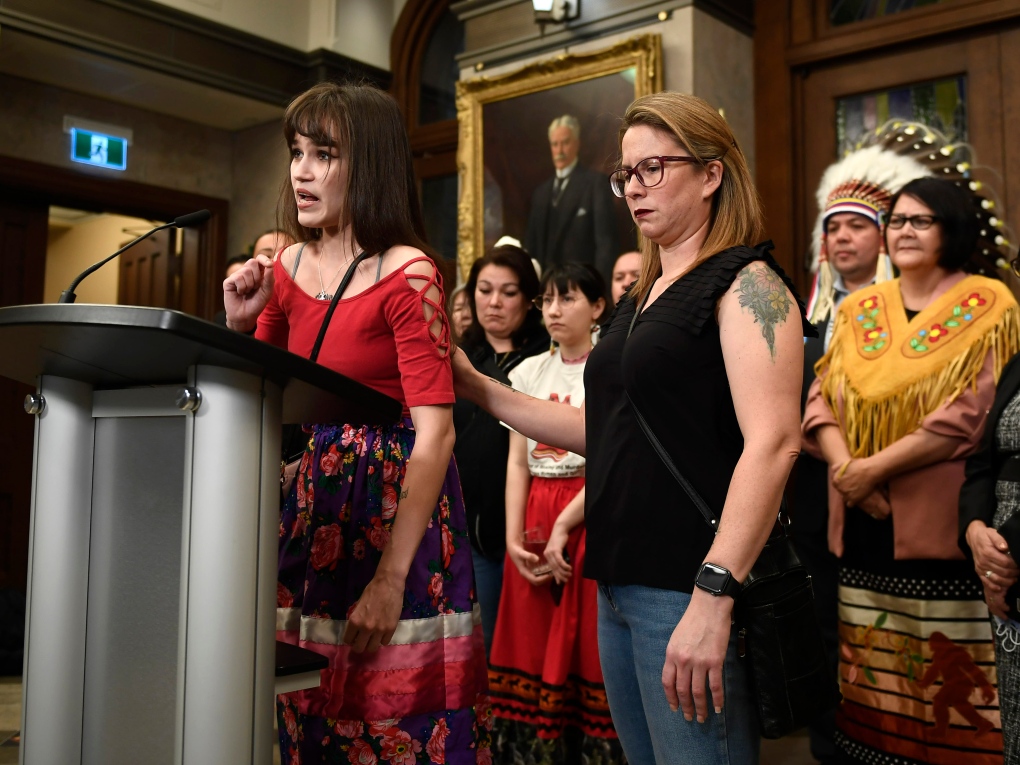 Cambria Harris, daughter of Morgan Harris, speaks during a news conference calling on the federal government to take action to end violence against Indigenous women, girls and two-spirit people, in the Foyer of the House of Commons on Parliament Hill in Ottawa, on Tuesday, Dec. 6, 2022. Police identified Morgan Harris as one of four women killed by an alleged serial killer in Winnipeg, but her body has not yet been found. THE CANADIAN PRESS/Justin Tang
Cambria Harris, daughter of Morgan Harris, speaks during a news conference calling on the federal government to take action to end violence against Indigenous women, girls and two-spirit people, in the Foyer of the House of Commons on Parliament Hill in Ottawa, on Tuesday, Dec. 6, 2022. Police identified Morgan Harris as one of four women killed by an alleged serial killer in Winnipeg, but her body has not yet been found. THE CANADIAN PRESS/Justin Tang
On Dec. 8, 2022, First Nations leaders called for Smyth to resign over the decision to not search the landfill.
The same day, the Manitoba government and City of Winnipeg announced operations at the Prairie Green Landfill would be put on pause while officials figured out next steps.
The following day, the police board announced it was looking at the option of bringing in outside help for a potential search. This came after calls intensified to search the landfill.
Brady Road Landfill blockade
A blockade was set up at the Brady Road Landfill entrance on Dec. 11, 2022, to amplify the voices of the families. Posts on social media showed debris scattered across the road with people standing behind.
On Dec. 13, 2022, Indigenous organizations started calling on the federal government to help with a landfill search, this, after Markus Chambers, the board chair of the Winnipeg Police Board, said the Indigenous community needed to advocate for the landfill search.
The next day, First Nations leaders formed a committee to do a feasibility study, to determine what it would take to search the landfill.
"We just want to move forward and be able to do the work and be able to bring our women home," said Assembly of Manitoba Chief Grand Chief Cathy Merrick in an interview.
On Dec. 15, 2022, the federal government signed on to fund the feasibility study, with then-Premier Heather Stefanson saying the next day the province would provide technical resources and expertise where needed, as well as provide support financially.
January 2023
After multiple weeks of demonstrators blocking the entrance to the Brady Road Landfill, the city announced on Jan. 5, 2023, it had reached a compromise that would allow the facility to reopen the next day. Demonstrators were allowed to stay at the entrance, but residential and commercial customers were able to access the area again.
February 2023
On Feb. 8, 2023, the federal government committed $500,000 toward a feasibility study looking at the potential search of the landfill.
May 2023
On May 5, 2023, the federal minister responsible for Crown-Indigenous relations said the feasibility study was completed and being reviewed.
On May 12, 2023, details of the study were revealed. It found a search could take up to three years and cost $184 million. It also stated there were "considerable risks" but forgoing a search could be more harmful to the families of the missing women.
June 2023
On June 8, 2023, more than a month after the feasibility study was completed, it still wasn't known who would fund a search, with then-Premier Heather Stefanson saying the search should be led by the federal government and the victims' families.
Demonstrators took to the legislature steps on June 14, 2023, demanding both the provincial and federal governments work together to start a landfill search.
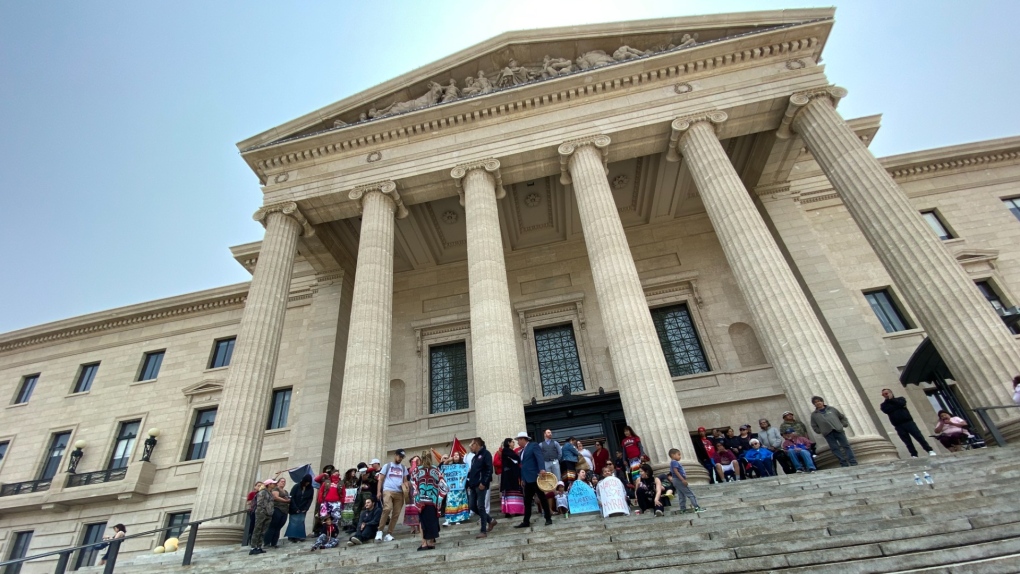 The families of two First Nations women whose remains are believed to be in a Winnipeg-area landfill took to the steps of Manitoba's legislature on June 14, 2023. (Source: Danton Unger/CTV News Winnipeg)
The families of two First Nations women whose remains are believed to be in a Winnipeg-area landfill took to the steps of Manitoba's legislature on June 14, 2023. (Source: Danton Unger/CTV News Winnipeg)
July 2023
On July 5, 2023, Stefanson announced the provincial government would not support a search of the landfill. This came after meeting with family members of the victims. Some of the family members walked out of the meeting after hearing the province's decision.
The next day, Stefanson again said the landfill search was in the hands of the federal government.
Following Stefanson's comments, another blockade appeared on the road leading to the Brady Landfill. The city shut down the landfill saying contingency plans for garbage collection were in place.
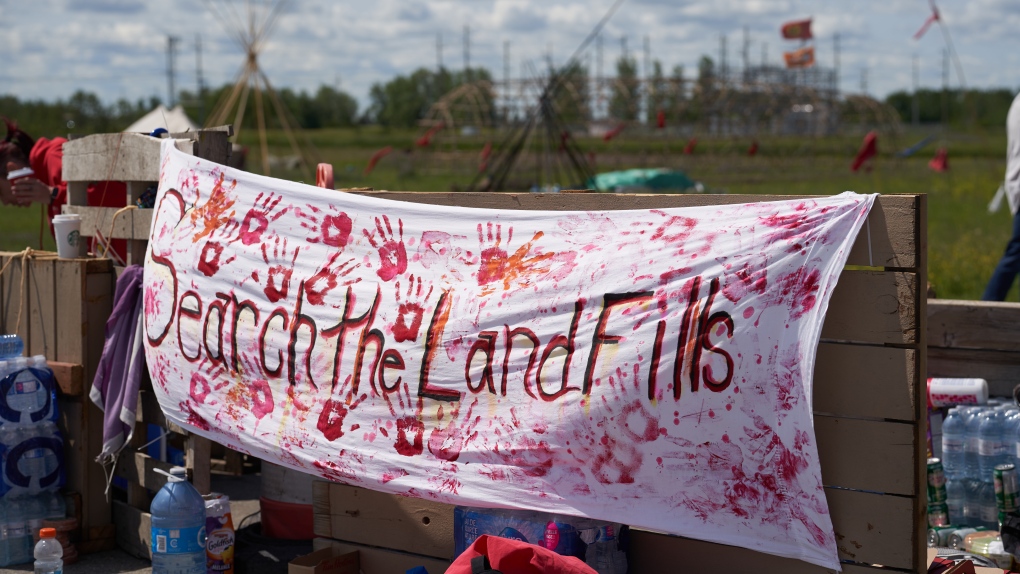 Activists for Indigenous rights blockade the main road into the Brady Road landfill, just outside of Winnipeg, Monday, July 10, 2023, after the city issued an order to vacate the blockade site by Monday at noon. THE CANADIAN PRESS/David Lipnowski
Activists for Indigenous rights blockade the main road into the Brady Road landfill, just outside of Winnipeg, Monday, July 10, 2023, after the city issued an order to vacate the blockade site by Monday at noon. THE CANADIAN PRESS/David Lipnowski
On July 8, 2023, the city ordered protesters to remove the blockade by July 10, 2023; however, the blockade stayed put.
A hearing for a court injunction to remove the blockade started on July 12, 2023, and the court granted the injunction two days later.
However, protesters said they would not back down, even after the injunction was served.
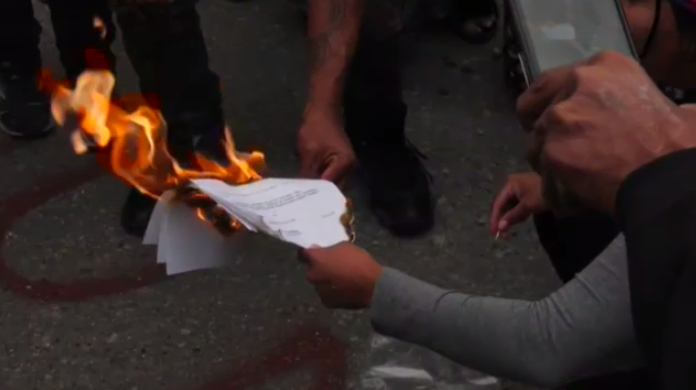 A copy of the injunction was burned, bringing a cheer from the growing crowd. (Source: Danton Unger, CTV News)
A copy of the injunction was burned, bringing a cheer from the growing crowd. (Source: Danton Unger, CTV News)
On July 18, 2023, the city removed the blockade to the Brady Landfill after police reached an agreement with those blocking the road.
The next day, an encampment was set up near the Canadian Museum for Human Rights, with those at the camp saying they continue to protest against the premier's decision not to support a search.
August 2023
With an election months away, Manitoba NDP Leader Wab Kinew announced on Aug. 9, 2023, that if his party was elected as the new government, the party would support a search of the landfill.
Then-Liberal Leader Dougald Lamont also took the stance in support of a landfill search, but the Progressive Conservatives stood strong on the decision to not search.
September 2023
The Manitoba Progressive Conservatives were under fire at the end of September after the party took out a full-page ad in the Winnipeg Free Press saying to answer to searching the landfill had to be no.
The former federal minister of Crown-Indigenous relations called the ad "cruel" and "heartless."
October 2023
After forming the new Government of Manitoba, Premier Wab Kinew met with the families of the two victims on Oct. 26, 2023, apologizing to them for being used as a "political prop" by the former government.
November 2023
On Nov. 6, 2023, Skibicki was in court for a pretrial hearing and he pleaded not guilty to all four counts of first-degree murder.
January 2024
In January, the family of Morgan Harris filed human rights complaints against the Progressive Conservative Party and the Manitoba government, alleging Indigenous women, girls, 2SLGBTQQIA+ people and their families were being discriminated against due to the delay in searching the landfill.
The Assembly of Manitoba Chiefs also released its feasibility study into a landfill search, saying it could cost $90 million, although searchers could face a "very high risk" from asbestos.
March 2024
The federal and provincial governments each commit $20 million toward funding a search of the Prairie Green Landfill.
April 2024
An attempt by Skibicki’s lawyer to have one of his charges quashed was dismissed by a judge.
Skibicki's lawyers said the count related to Buffalo Woman should be quashed due to the fact her body has not been found and she has not been identified. Chief Justice Glenn Joyal rejected the request.
On April 29, 2024, the trial for Jeremy Skibicki commences, with his lawyers arguing to have the jury removed, saying the two years of case coverage before the trial had influenced the jury. Manitoba Court of King’s Bench Chief Justice Glenn Joyal dismissed the request.
May 2024
Lawyers for Skibicki have admitted in court the accused killed four Indigenous women, but argue he is not criminally responsible for the deaths by way of mental disorder.
The case will now be heard by a judge alone starting May 8, due to complexities with the defence.
On May 8, court heard for the first time a recorded interview of Skibicki talking to two homicide detectives while in custody and confessing to killing four people.
"I was driven to do stuff like this because I was so, so spent emotionally. I killed four people," Skibicki said while talking to the detectives.
He detailed to police how and why he killed the four women, saying he believed he was called by God.
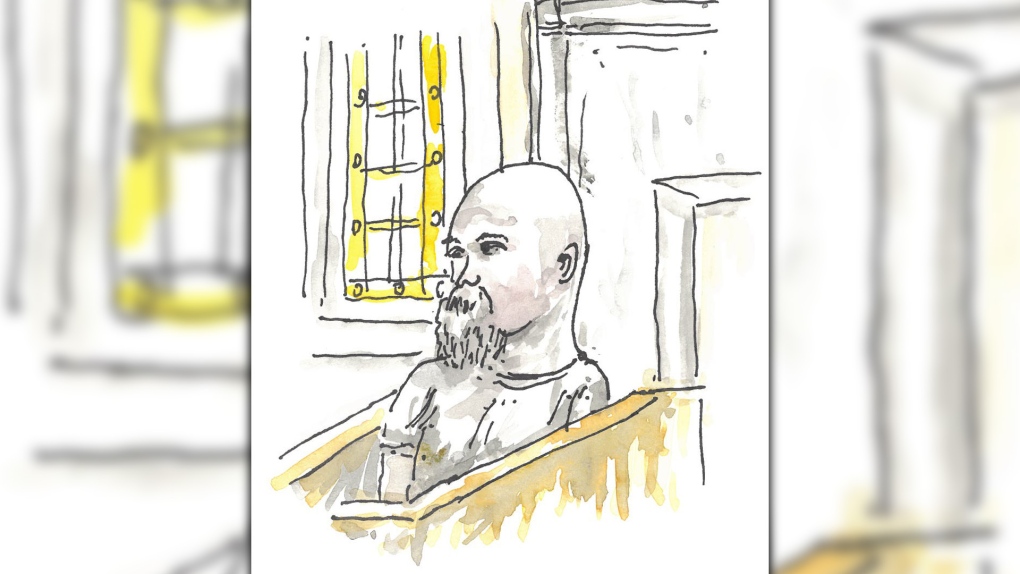 Jeremy Skibicki is pictured in a courtroom sketch on May 6, 2024. (James Culleton)
Jeremy Skibicki is pictured in a courtroom sketch on May 6, 2024. (James Culleton)
Court also heard a 911 call from a man who found partial remains of an Indigenous woman while he was looking through garbage bins. The remains were later identified as Contois.
On May 9, court was told physical evidence of victims were found in Skibicki's apartment, including jewelry, clothing, DNA and a bloodstained bathtub.
On May 10, Const. Brian Neuman – the officer who recovered partial human remains from a North Kildonan dumpster – testified, detailing how police requested all garbage collection to stop and then how officers spent a number of days searching the Brady Road landfill.
On May 13, several video clips from security cameras were played in court which showed Skibicki on late-night outings, disposing of body parts in nearby garbage bins and dumpsters.
Court heard police went through more than 2,000 hours of video from homes and businesses around Henderson Highway and homeless shelters in the city.
The following day, Crown prosecutors asked that Skibicki have a mental assessment done by their expert psychiatrist to determine if he was suffering from a mental disorder at the time of the offence.
On May 15, a worker at a Winnipeg homeless shelter testified, saying he previously talked with Skibicki while he was at the shelter, and told him he was only there to stalk his victims.
A neighbour of Skibicki's also testified about a couple of late-night encounters with Skibicki, which included hearing his shower being used multiple times starting at 1:30 a.m. and then seeing him carrying baskets up and down stairs. Skibicki told him he was getting rid of garbage.
Skibicki's ex-wife testified on May 16, detailing a violent and sexually abusive relationship with Skibicki.
She said she met him at a homeless shelter in 2018 and married him after she said she felt "stuck."
She said the relationship was volatile and controlling.
“When I would sleep, he would have sex with me," she told the court.
She also told the court she was worried for her safety and highlighted several violent incidents – one of which left her with a concussion that has since impaired her vision.
On May 21, Skibicki's internet search history was shared with the court. He searched up subjects like the definition of a serial killer, beheadings, garbage collection dates and questions about DNA evidence.
The following day, letters from Skibicki to a female inmate in Nova Scotia were entered as evidence in the trial. Skibicki talked about how he was probably one of the most hated men in Winnipeg. He also addressed his "extreme views" and how he feels he would still get convicted even if he had "100 experts while the Crown has none."
June 2024
On June 4, Dr. Sohom Das, a forensic psychiatrist from the United Kingdom, told the court Skibicki killed the four women after years of violent acts that stemmed from mental illness.
"I believe the delusions and the psychotic symptoms caused by schizophrenia directly motivated those killings," Das told the court in his testimony.
Das said he interviewed Skibicki twice, noting Skibicki knew what he was doing was wrong, but he was compelled to do it.
The following day, a separate forensic psychiatrist, Dr. Gary Chaimowitz, told court he didn't believe that Skibicki was schizophrenic, and said Skibicki was driven to kill through his sexual attraction to dead bodies.
He believed Skibicki had anti-social personality disorder, substance abuse disorder and homicidal necrophilia.
Chaimowitz spoke with Skibicki for eight hours over the May long weekend after the Crown asked for Skibicki to have a mental assessment done.
Closing arguments in the month-long case were made on June 10 by the defence and Crown. The defence argued Skibicki has long struggled with schizophrenia and that's what led him to killing four women, while the Crown argued he has never been diagnosed, saying the killings were planned and deliberate.
A verdict will be delivered on July 11, 2024.
On June 11, the province announced the next steps for searching the Prairie Green landfill. The province approved an alteration to the Environment Act licence, which would allow for search activity to begin at the landfill.
Premier Wab Kinew said prep work is already underway at the landfill and that a five-step plan has been laid out to search.
There is a support line available for those impacted by missing and murdered Indigenous women, girls, and LGBTQ2S+ people: 1-844-413-6649.
The Hope for Wellness Hotline for Indigenous people, with support in Cree, Ojibway, and Inuktitut, is also available 24/7 in Canada at 1-855-242-3310
-With files from CTV’s Jeff Keele, Charles Lefebvre, Danton Unger, Alexandra Holyk, Jon Hendricks, Tayor Brock, Daniel Halmarson, Josh Crabb, Dan Vadeboncoeur and The Canadian Press.
CTVNews.ca Top Stories

Things a pediatrician would never let their child do
As summer begins for most children around Canada, CTV News spoke with a number of pediatric health professionals about the best practices for raising kids, and how the profession has evolved since the COVID-19 pandemic.
Should he stay or should he go now? A look at Trudeau's options after byelection loss
A historic defeat for the Liberals in a downtown Toronto byelection has put a glaring question mark on Prime Minister Justin Trudeau's political future. Here's a look at the options Trudeau and the Liberals face as they enter a summer of soul-searching.
Alabama man denied office after winning election reaches proposed settlement to become town's first Black mayor
An Alabama town and a Black man who was prevented from becoming its mayor after winning his 2020 election have reached a proposed settlement, according to federal court documents.
Many older adults are still taking daily aspirin, even though some shouldn't be, experts say
Some seniors continue to take a daily aspirin in the hopes of reducing their cardiovascular disease risk, even though the practice is only recommended for certain high-risk patients -- and taking it without a doctor's recommendation can come with significant risks.
Ukraine's Zelenskyy scolds officials who shirk their duties in the country's war effort
Ukrainian President Volodymyr Zelenskyy signalled Wednesday that he is getting tough on officials he suspects are shirking their duties in the war with Russia that is now in its third year.
New experience in Halifax gets people up close and personal to the ocean's most feared predator
Atlantic Shark Expeditions launched a new shark cage experience which gives brave attendees a chance to get up close and personal with the oceans most feared predator.
Pre-med students can't take MCAT in Quebec because of Bill 96
Areeba Ahmed says she's always dreamed of becoming a surgeon but her road to the operating room has become a complicated one ever since Quebec's French language law came into effect.
Suspected North Korean hypersonic missile exploded in flight, South Korea says
A suspected hypersonic missile launched by North Korea exploded in flight on Wednesday, South Korea’s military said, as North Korea protests the regional deployment of a U.S. aircraft carrier for a military drill with South Korea and Japan.
One of Canada's most popular vehicles recalled over transmission issue; 95,000 impacted
One of the country's most popular vehicles is being recalled in Canada due to a transmission issue that may impact tens of thousands of drivers.


































